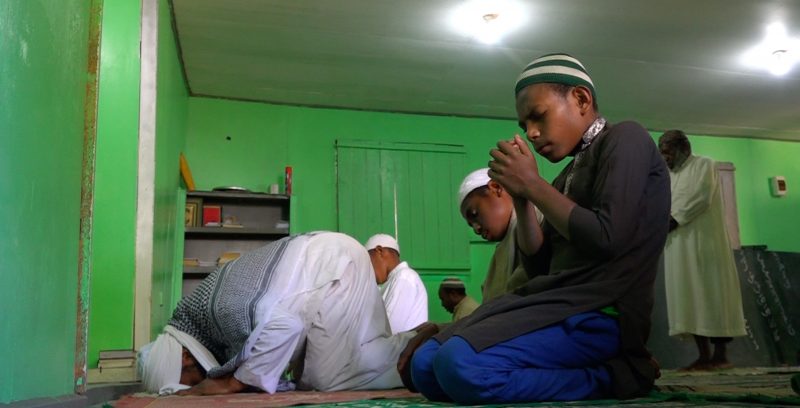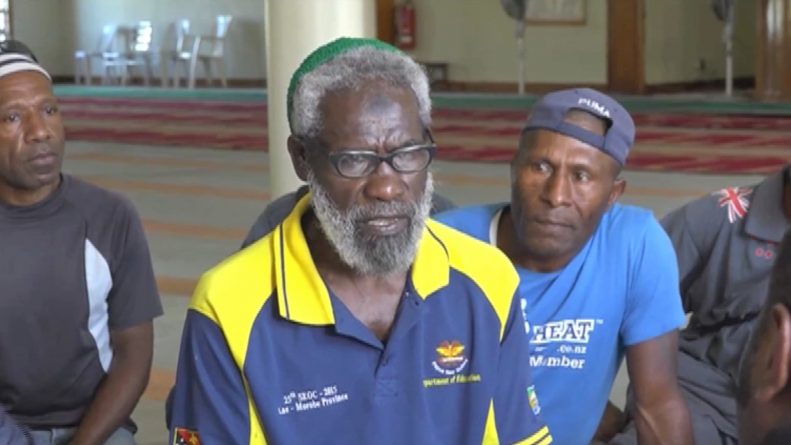As a small group of men and boys prepare for Friday Prayers, in Kagamuga, Western Highlands, a local Imam, makes a muslim call to prayer at midday on a Friday.
The Arabic language sounds very foreign here. This is one of the few Islamic communities in the Western Highlands finding its way in a country that describes itself as predominantly Christian.

Inside the small mosque, the men and boys line up in front as the prayers begin. The women, as per the Islamic teachings, are in another room.
“When I built this mosque, I was alone. I had not received any formal training yet when I converted to Islam,” says the local Imam, Ahmad Didat. “Then the boys nearby came and joined me. Then the community came.”
Ahmad Didat, used to be known as Nixon. About 10 years ago, he converted to Islam after three years of prior travel and intense study. He says, the similarities of Islamic culture to Melanesian customs was one of the things that drew him to the religion.
Mt. Hagen’s Muslims are a group struggling to find their place both in Papua New Guinea and in the global Islamic community of 2.4 billion Muslims around the world.
Soon after Ahmad Didat converted to Islam, his whole family including his mother and father converted as well. The family adopted Islamic religious practices, Arabic names, middle eastern style clothing and Didat began teaching a small group of children in Arabic, a language he had started to learn himself.
“We have Arabic teachers who teach us the basics. You know, like, boy…girl…they are running. The Koran is written in Arabic. It is the original language.”
Islam is a controversial subject in Papua New Guinea. With many people professing to be Christians at least by religious groupings, Islam is viewed with a lot of suspicion. Over 40 years, many more have tended to judge the religion based largely on how international media links the religion to global terrorism. This has triggered the ongoing discrimination against this small group of Muslims in Mt. Hagen.
“I was one of those who questioned members of the Muslim communities,” says Didat. “Then I became a Muslim myself.”

Islam is relatively new in Papua New Guinea. In 1982, the Papua New Guinea Government under Sir Julius Chan, gave permission for a mosque to be built in Port Moresby. It was the start of a 30 year journey that has resulted in the conversion of more than 6,000 Papua New Guineans to Islam.
Khalid Apai, a former representative boxer from Bougainville converted to Islam in the late 1980s. Since then he has become a prominent member of the Islamic community in Papua New Guinea.
“It is the interpretation of the book that is confusing. It’s not the people. If we teach them. If we come together and talk about it, then they will understand. The holy book, the Bible and the Koran, they are the same. But it is how people are interpreting it that we think is wrong.”
At the Hohola Islamic Center, the Grand Imam of the Port Moresby, Ibrahim Aziz, who has been in the country for more than 30 years, says it has been an interesting three decades for PNG’s Islamic Community.
“I am thankful to Almighty God. I came here in 1989. When I came there were a few Muslims who became Muslims. Twelve of them. Now, they are all over the country,” Imam Ibrahim says.

Like Judaisim and Christianity, Islam is a monotheistic, Abrahamic religion. In other words, Muslims believe there is one God and according to tradition, they trace the roots of their religion to the time of Abraham. The same Abraham mentioned in both Christian and Jewish writings.
Christians and Muslims defer on fundamental teachings. Where a majority of Christianity accept the trinity, Muslims believe in the singularity of God. What usually triggers religious disputes and intolerance is the Muslim view that Jesus, according to Islamic teaching is one of the many important prophets of God.
“We are not antichrist, We are not anti-Noah, We are not anti-Moses. In fact, we accept all of them.”
This is the part of Islam that many outside the religion have not grasped. Khalid Apai, regularly speaks to people willing to listen. Even after practicing Islam for more than 30 years, he feels no need to impose his religious beliefs on other Papua New Guineans.
“Those who do not understand, I say, come and let’s talk together. You can jump over the fence. It is there to keep the dogs out. Come and we talk and you will understand Islam.”


